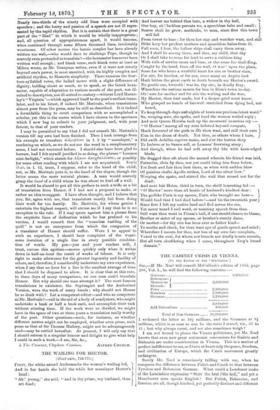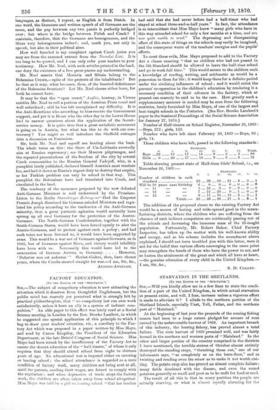THE CABINET CRISIS IN VIENNA.
[TO TIIE EDITOR Or THE SPECTAT011.1
Sin,—If Mr. Noel will consult McCulloch's edition of 1866, page 288, Vol. I., he will find the following statistics :—
Germans 8,200,000
Bohemians Moravians 3,600,000 Slovacks Poles 2,200,000 Russians 2,800,000 Slovenes 1,210,000 9.810,000 Add Dalmatians 400,000 Total of Non-Germans 10,210,000 I reckoned the latter at 10f millions, and the Germans at 8} millions, which is as near as can be the ratio I stated, viz., 33 to 41; but why always count, and not also sometimes weigh ?
I am not bound to please the Vienna politicians, yet Mr. Noel knows that even now great autonomic concessions for Galicia and Dalmatia are under consideration in Vienna. This is a matter of perfect indifference to me, as I have at heart only the peace, freedom, and civilization of Europe, which the Czech movement greatly endangers.
Surely Mr. Noel is consciously trifling with we, when he compares the difference between Polish and Czech to that between Tyrolese and Bohemian German. What could a Londoner make of the Lancashire expression " Shuv the bret boil," and yet a Manchester man speaks English ? But Polish, Bohemian, and Russian are all, though kindred, yet perfectly distinct and different
languages, as distinct, I repeat, as English is from Dutch. In one word, the literature and written speech of all Germans are the same, and the gap between any two patois is perfectly bridged over ; but where is the bridge between Polish and Czech? I maintain, therefore, that the Germans are homogeneous, and the Slays very heterogeneous indeed ; and, mark you, not only in speech, but also in their political aims.
How well founded is my complaint against Czech juries you may see from the annexed extract from the Narodni Listi. It is too long to be quoted, and I can only refer your readers to your testimony. How Mr. Noel, with such articles printed in the land, can deny the existence of a free press passes my understanding.
Mr. Noel asserts that Moravia and Silesia belong to the Bohemian Crown,—spite of the protests of the inhabitants? But be that as it may, what becomes, then, of the boasted definiteness of the Bohemian frontiers? Let Mr. Noel choose either horn, for both he cannot have.
It may be that the "open secret," Any/ice, hearsay, in Vienna entitles Mr. Noel to call a portion of the Austrian Press venal and well subsidized ; still he has left unexplained my difficulty. It is the Anti-Beustiaus who according to hinsreceive the Government support, and yet it is Beust who the other day in the Lower House had to answer questions about the application of the Secret- service money. It is quite true that a great socialistic movement is going on in Austria, but what has this to do with our con- troversy? You might as well introduce the Sheffield outrages into a discussion on Fenianism.
Sir, both Mr. Noel and myself are beating about the bush. The whole turns on this : the Slays of Cis-Leithania avowedly aim at Russian supremacy ; see their Moscow pilgrimages, and the repeated presentations of the freedom of the city by several Czech communities to the Russian General Fadejeff, who, in a pamphlet lately published, declared himself Austria's most resolute foe, and laid it down as Russia's urgent duty to destroy that empire, as her Turkish problem can only be solved in that way. This pamphlet the Bohemians have had translated into Czech, and circulated in the land.
The tendency of the measures proposed by the now defeated Anti-German Ministers is well understood by the Prussians. Listen to the Berlin Stautsbitiver Zeitung :—" Had the Emperor Francis Joseph dismissed his German-minded Ministers and regu- lated his policy according to the tendencies of the Anti-German minority, then a great patriotic agitation would naturally have sprung up all over Germany for the protection of the Austro- Germans. The North-German Confederation, together with the South-German States, would have been forced openly to abet the Austro-Germans, and to protest against such a policy ; and had such voice not been listened to, it would have been supported by arms. This would be a war not of Germans against Germans, as in 1866, but of Germans against Slays, and victory would infallibly have been with us. Necessarily this would have led to the
annexation of German Austria to Germany However, ‘Defertur non eat aufertur.' " Herbst-Giskra, then, have chosen peace, where the Czechs steered straight for war.—I am, Sir, &c.,
AUSTRO-ANGLIAN.

































 Previous page
Previous page